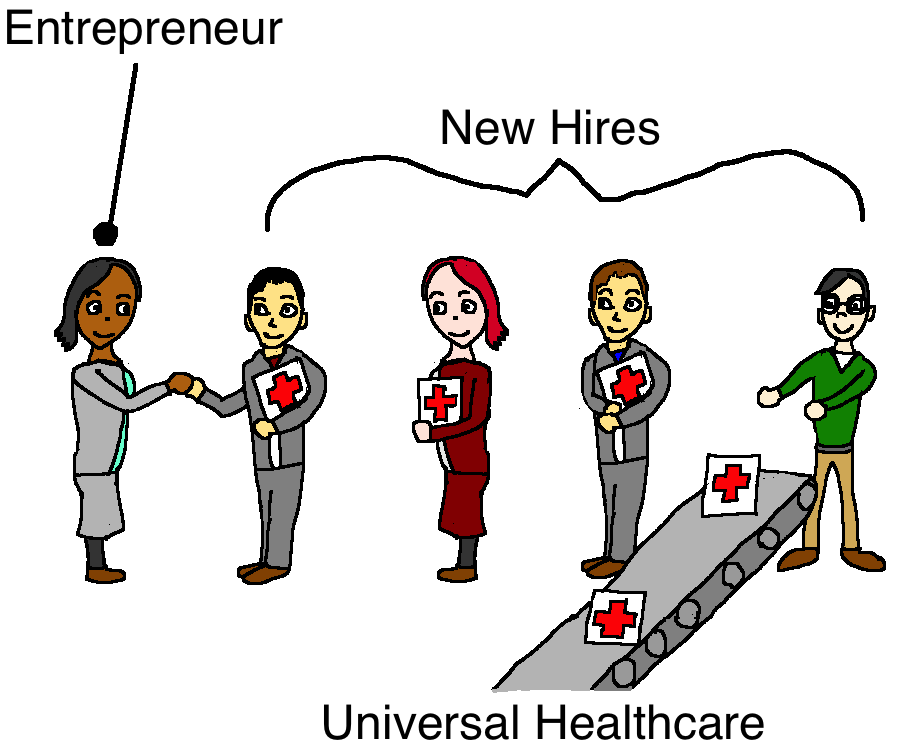|

Chickpea and Grape Lettuce Wraps
Grace K. (original recipe)
|
A warning to sensitive readers: This post includes a few occurrences of profanity. I have scrutinized each instance and decided there is no suitable linguistic alternative or I would have used it. If you want, get someone else to read it for you and summarize the important points. Or you can just scroll through quickly and admire the illustrations.
|
I've never been to Nevada. I did plan a train trip there once, but it was not meant to be. So when it comes time to pander to Nevada, I decided to buck the stereotypes and write about what polls show is Nevada voters' top issue, the Economy.
But first, stereotypes.

Non-Nevadans, we tend to think of Las Vegas and its tolerance for "sin" industries such as legalized gambling. In the case of gambling, I am generally supportive of the right to informal, dispersed gambling such as sports betting, despite the relatively crass commercialization that was inevitable. For some, sports gambling may enhance their fan experience of Sport, which I am pretty fine with.

On the other hand, I think that it is laudable that casino gambling is limited to certain destinations that should be celebrated and allowed to flourish in their own tacky ways (a fucking river boat!), and to Indians because obviously who are the rest of us to tell them what to do (controversial as gambling may be within their communities). Casino- or resort-style gambling is entertainment with externalities. Limiting it geographically keeps it special (boosting the entertainment value) and allows us to focus resources to control externalities.
 |
|
To the rich man's bright lodges, I ride in this wind
On my good horse, I call you, my shiny black Bess
To the playhouse of fortune, to take the bright silver
And gold they have taken from somebody else
-Woody Guthrie, The Unwelcome Guest
|
|
I think it's unfortunate that my own state of New York legalized casino gambling since it is essentially zero-sum: stealing audiences from other forms of entertainment, or stealing visitors from other gambling destinations like Atlantic City which are in decline but should be awesome stupid getaways for once in a while. For Nevada, I support the status quo but the status quo has implications on economic policy since we don't want people driven to sin for a lack of other options. So more on the Economy.

Working within the system, I see a pretty limited role for the President. The economy is dynamic, and the way the system works, the economy's inevitable movements hurt some -- while predictably benefiting others. Around the world broken systems persist because they benefit someone. So maybe the job is to change the system, generationally if necessary. And this is what recent Presidents fail to do.

Since I am pandering, let's shit on Al Gore. His run for the presidency was my first time voting in an election. At the time he was rated more politically conservative than Newt Gingrich. For eight years as vice president, he and the President did little with the platform to advance the climate mitigation movement. Silently, almost behind the scenes, they held a line on public lands, in contrast the Reagan/Bush administrations before them and W. Bush administration that followed. But nothing to, say, evoke the spirit of patriotism to support a national effort to wean ourselves from fossil fuels.

It's easy to shit on Al Gore. He came to the climate movement late with quite a lot of pomp, while in many ways not a desirable spokesperson or role model. At a particularly low point for me personally, I wanted to put out a challenge to Al Gore to face me in ping pong. The terms were he could have as much time to prepare as he wanted; I would take only 24 hours. I guess it was a way of reminding myself, even at that low point, I could probably beat Al Gore at ping pong. We do weird things to get by.

What does systemic change to the U.S. economy look like? I think universal healthcare is the obvious first step.
I will assume imaginary consensus around the moral argument and leave that for another place. Andrew Yang is the only politician I've heard make the case that universal healthcare would be good economic policy. It's obvious how universal healthcare would help workers, but it would also encourage entrepreneurship and create jobs by lowering the private cost of labor. Just as critically, it would help insulate Americans' wellbeing from the inherent swings of the economy. It just makes sense. Private insurance companies have tremendous overhead and spend resources fighting payouts rather than paying for care. No other wealthy country does it this way, because it is stupid. I'll consider expounding on this issue at another time. I'm trying to keep this discussion focused and moving.

I admire Obama's near-miraculous passage of the Affordable Care Act because it was a practical step and proved to be exactly as ambitious as politically possible in that moment. But even Obama dropped the ball when it came to using the platform of the office to advance universal healthcare in the long run. He had said that he would favor a system of universal healthcare if building the system from scratch. I guess he saw entrenched interests and made a political calculation of what he could achieve. Maybe he really felt the upheaval of changing the system would hurt more people than it would help. That sounds kind of naive, though. The idea of a just transition is foundational among activists. Nevadans care about the Economy. It isn't working for them. They deserve change. They can be patient. We can do it right.
 |
|
And our time is flying, see the candle burning low
Is the new world rising, from the shambles of the old
If we could just, if we could just, if we could just
If we could just, if we could just join hands
That's all it takes, that's all it takes
-Led Zeppelin, The Rover
|
|
Fundamentally, we created the Economy and it should work for us instead of we are victims of it.
I think it is about more than who can drive a fancy car and who waits an hour for the bus. Nevada voters support gun control but are understandably split on exactly what approach to take or whether it will truly be effective. I think gun violence can be linked to the socio-economic landscape that potential perpetrators find themselves in. My premise is that most homicidal or suicidal tendencies stem from a lack of meaningful (healthy?) relationships and/or responsibilities. This probably sounds like the realm of social policy but there is also an economic dimension. I think the American Dream is alright and fine as a weird anecdotal thing, but it also seems to posit a system where a lot of people are losing out and I'm less keen on that aspect. No one asks to be born! People without a secure and legitimate vision for themselves in the future may turn to criminality in general, and to acts of mass violence in extreme cases. Suicide in particular is pretty unnatural and we should be alarmed that it is so common. It is a symptom that something is very wrong. We evolved through really shitty circumstances because we were hard-wired to want to live. It's hard to preach compassion when this message is dampened by economic policies that lack compassion.

Some will say, America is a melting pot, our lack of homogeneity means we lack a cohesive social fabric that can steer folks into pro-social behaviors. Maybe this is so, but if so, we can only embrace the positives of diversity, and if there is a downside, maybe our economic policies should help address these challenges. What is it about America, that so many feel disillusioned and turn to gun violence for a sense of control?
What can we do, so that literally everyone feels included? The Greens advocate for guaranteed employment. We can discuss it. But being coerced into an empty life is equally perilous. Making money is great but, at minimum, the government should help each of us carve out some kind of meaningful existence. I would also support universal art supplies. But healthcare is perhaps more pressing. It will help give people space to find their place.
Universal health care may be inevitable because younger generations expect better, they expect what everyone else gets, but it ain't gonna come unless we demand it -- demand it of our politicians!
As for the recipe, I will once again choose to substitute chickpeas for chicken. Chickpea-lettuce wraps sound very good, especially with Indian seasoning. I have no idea how the grapes will work, but I'll test it so you don't have to. I almost swapped them out for pomegranate arils because they are in season and ever-so tempting, but decided it would be too dramatic a departure -- so grapes it is!
Ingredients
- 1/4 small Red bell pepper, diced
- 1 1/2 tsp. Un-chicken powder
- Grapes, halved, as garnish
Preparation
Heat oil over medium heat. Add the ginger and cook, stirring, for about 1 minute, until fragrant.
Add the chickpeas and pepper, then cook for approximately 3-4 minutes, stirring occasionally.
Meanwhile, add the garam masala, cashews, water, and un-chicken powder to your blender and blend
into a uniform liquid. Add liquid to the pan with the chickpeas and cook until it reaches the
desired texture, still wet but not pooling. Season with salt and pepper.
To serve, pick out a nice looking lettuce leaf and fill with chickpea mixture. Garnish with
grapes and enjoy!
Discussion
My first attempt was fairly faithful to the written recipe and while I ate it and it was
alright, I was not very excited to eat it again. So I decided to switch it up and my
second effort (recipe above) was a big improvement. I think chickpea lettuce wraps have
even more potential than what I have to show. In the warmer weather I may try to improve
the recipe further.
|
|